Insights
Data Science at ACIL Allen
22/10/2025
Data science is a multidisciplinary field concerned with the lifecycle of obtaining and managing data and extracting useful information and insight from data. The field involves an interface between information technology, computer science, statistics, machine learning, and evaluation/auditing. It is typically concerned with large-scale cases where methodological rigour, scalability and continuous improvement are important (as opposed to one-off or ad hoc uses of data). For modern businesses, governments, and other institutions, the drive to be “data driven” in decision-making requires attention to data as a major business asset and this requires corresponding attention to the data lifecycle. Many modern institutions are building their data capabilities through dedicated data science resourcing, policies, and procedures, to ensure that they have a systematic approach to the collection, management, and use of data for their business operations.[1]
Whilst the importance of systematic data processes is generally well understood in modern institutions, the development of good processes is often hampered by failure to incorporate evaluation and auditing needs during the development and implementation of data science operations. Evaluation is often treated as a separate matter, or worse, it may be ignored entirely and only brought in as an afterthought when processes begin to break down or fail to operate in a manner that adds value to the institution. In such cases, data science may be directed towards a static objective, but the implemented processes may fail to allow for evaluation/audit needs, making it hard to detect when a data system is fit-for-purpose and operating in a way that meets changing business needs. For this reason, ACIL Allen approaches data science as a multidisciplinary endeavour that is linked with economic and process evaluation from the outset. Our approach builds on traditional understanding of data science processes to incorporate explicit evaluation pathways to aid in continuous improvement of data systems.
In Figure 1 below we give a schematic of data and modelling for business processes, including both operational needs and accompanying evaluation/audit needs. This breakdown is our own variant on standard data modelling diagrams in the field, where we incorporate evaluation/audit needs and processes as an explicit part of the process.
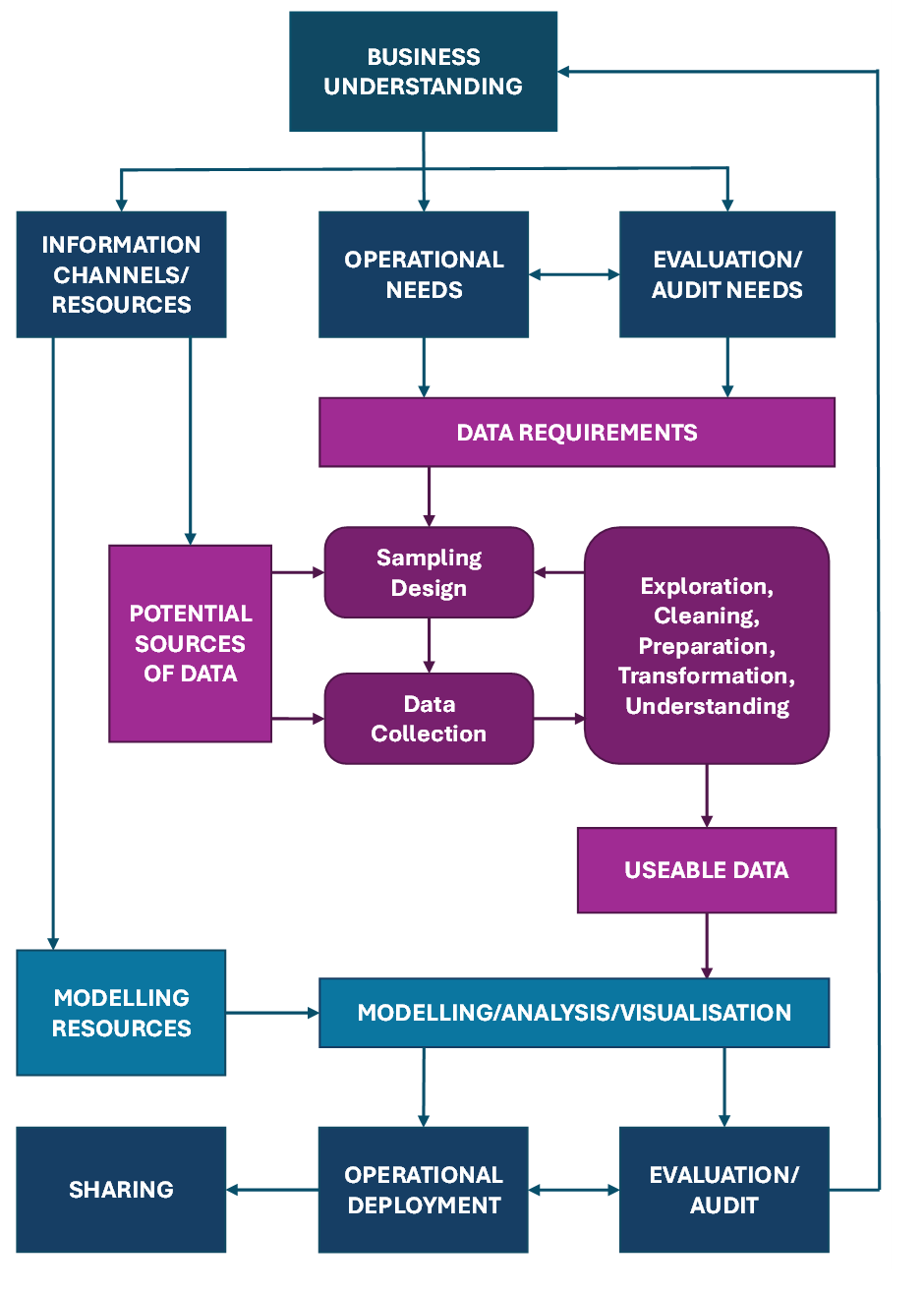
Figure 1: Data and modelling for business processes
(operational needs and evaluation/auditing)
As shown in the figure, the implementation of data science must start with an understanding of the business for which it is deployed. This includes a clear understanding of the operational needs of the business, the evaluation/audit needs that accompany the operational and management processes, and the information channels and resources through which the business has access to data and modelling capabilities. Once the business needs are properly understood, the data requirements are formulated and the potential sources of data are examined. Potential data sources will typically include external data sources and potential internal data sources that could come from the collection and cataloguing information from the business and its stakeholders. From the data requirements and the identified sources of data, there is a sampling design and then data collection, with parallel processes to explore, clean, prepare, transform, and understand the data. This is an iterative process and may involve refinement of the sampling design and further data collection to meet the data requirements. This manifests in data in a form appropriate for modelling, visualisation and other uses. Modelling resources are then deployed for the modelling and analysis of the data, and visualisation of outputs. The outputs of this analysis are used for operational deployment and for accompanying evaluation/audit. Finally, the evaluation/audit findings flow back into the understanding of the business, which creates a feedback loop for continuous improvement.
Understanding the data lifecycle
ACIL Allen provides an approach to data science that is heavily informed by our specialist knowledge in economic evaluation. Consideration of evaluation needs is built into the examination of data requirements and the implementation of data collection, modelling, and analysis. Operational needs and evaluation processes work in parallel to ensure that decision-makers are able to evaluate, refine, and change their operational processes for continuous improvement of their business and their data processes.
The process of transitioning from data requirements to useable data (shown in purple in Figure 1) is a process undertaken for particular business purposes. However, underlying this process is a data lifecycle that applies to all data used in the business, which requires clear data governance processes. In Figure 2 below we show an elaborated data process including the embedded data lifecycle. Data is first collected or created based on the data requirements for operational and evaluation/audit needs. It is then stored in some appropriate facility and maintained through data stewardship roles set out in governance processes. The stored data is then processed and managed to put it into useable form, and then used for operational purposes and evaluation/audit purposes. Finally, data that is no longer required for use is either archived or destroyed based on business needs and operative data privacy principles.[2]
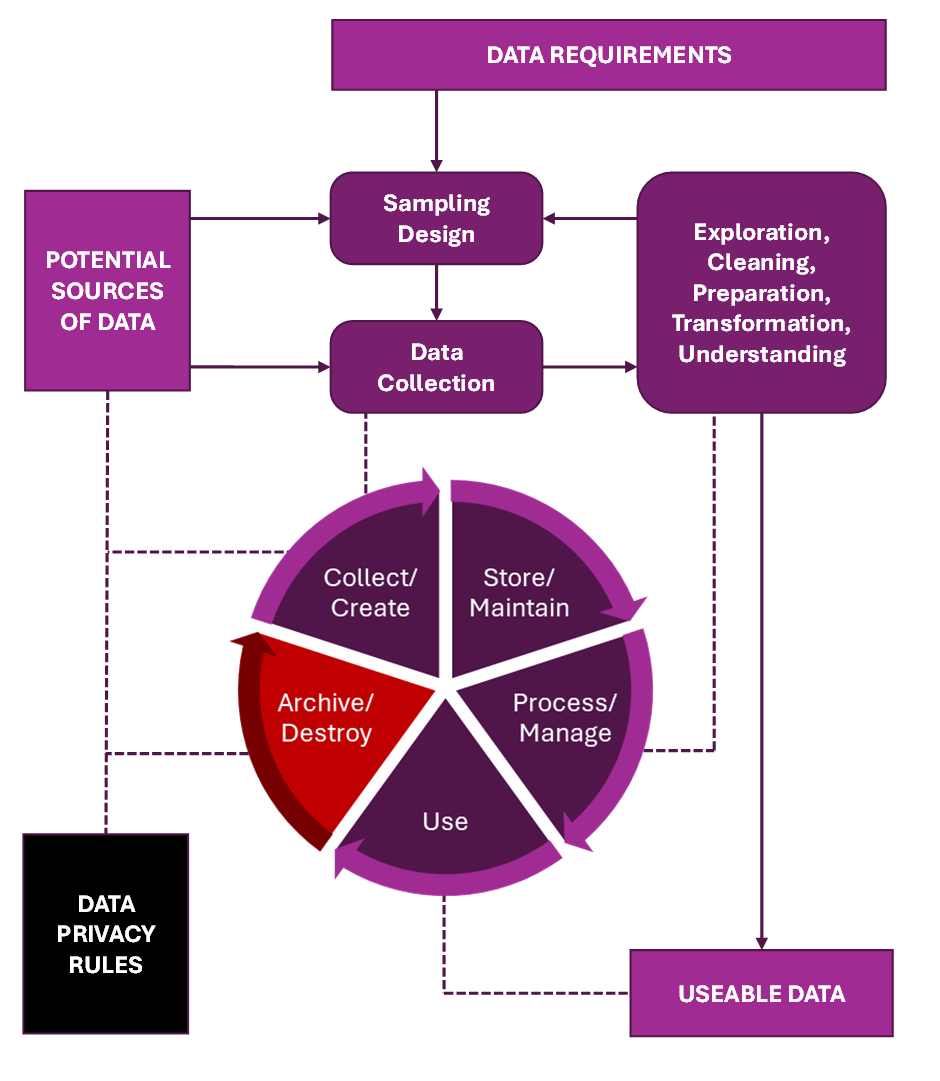
Figure 2: Elaborated data process with embedded data lifecycle
ACIL Allen Data Science services
Maintaining well-functioning data science processes, with appropriate evaluation/audit processes and accompanying data lifecycle processes requires a broad range of skills in data science. An overarching system of data strategy and governance is required to set the strategy of the data system and the relevant management and stewardship processes and roles. Uplift of data organisation and culture is often required to aid implementation of management and stewardship processes. Likewise, effective data training/support and attention to data and digital culture within an organisation may be needed to ensure high-quality practice. These organisational and cultural services are often combined with various technical data services to uplift data systems.
ACIL Allen provides a broad range of data science services, from organisational services such as data strategy, governance, training and cultural uplift, to technical data services supporting the entire data lifecycle. Our primary services in the field include:
- Data Strategy and Governance
- Data Organisation and Culture
- Data Quality Review & Uplift
- Metadata and Documentation
- Research Design
- Data Import/Export/Validation
- Data Integration/Transformation
- Data Analytics and Modelling
- Machine Learning and AI
- Data Visualisation and Mapping
- Business Intelligence
- Evaluation Processes
- Process Optimisation
- Process Automation
- Simulation Modelling
- Data Training and Support
- Data and Digital Culture
Data science services at ACIL Allen are supported by our “user-centric uplift model” that focuses on the interface of system/product features and user-experience. Consideration is given to user goals, user stories, data on users and usage, feedback from users, long-term requirements of users, operational needs, training and support, etc.
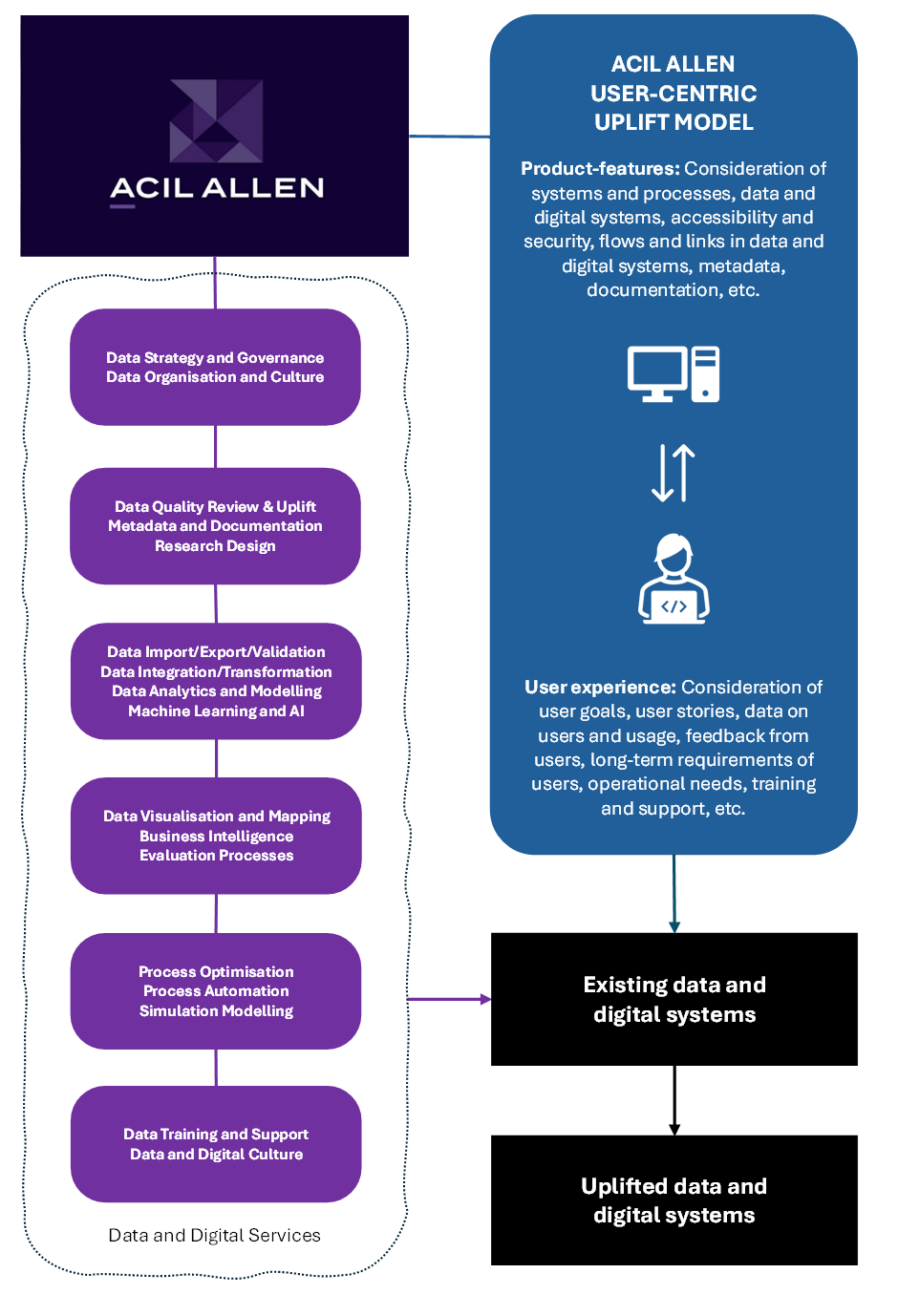
Figure 3: ACIL Allen data science service and our user-centric uplift model
Data culture drives data processes
In our experience reviewing and uplifting data science processes, we have found that data science systems and processes are only as good as the stewards who care for and operate them. Good processes must be supported by a strong “data culture” where users care about the quality of data and care about what data has to say about business problems they are facing. Our experience in this field has led us to identify fundamental “data culture pillars” that we consider to be core requirements of good data culture. Our four ACIL Allen data culture pillars are explained in Figure 4 below.
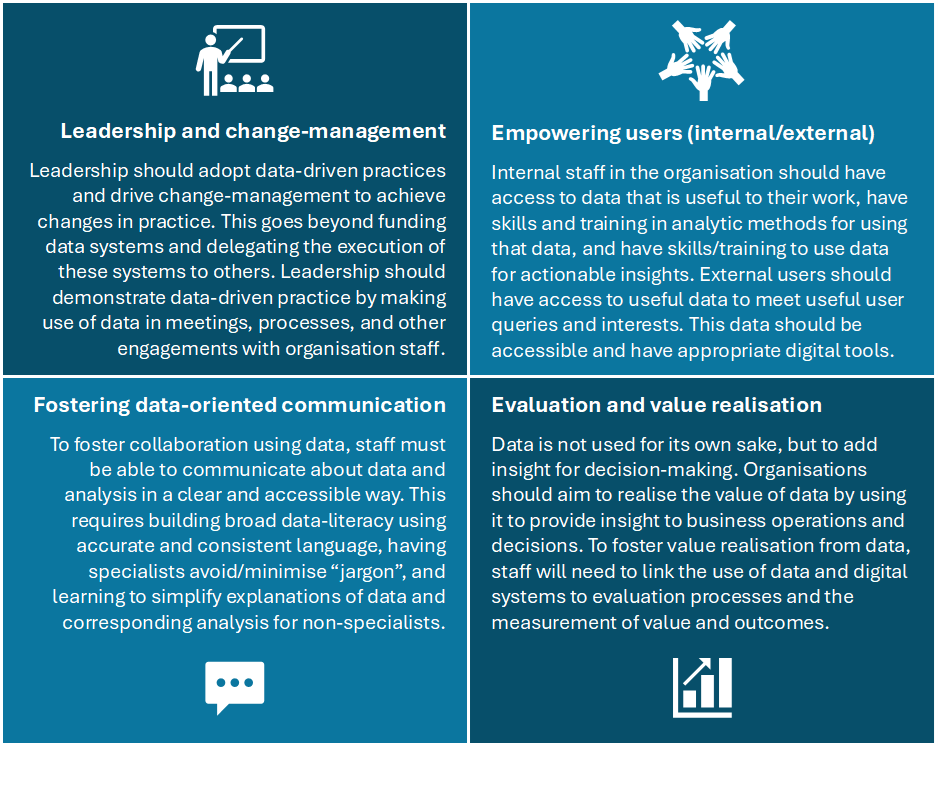
Our data training and support services are oriented around parallel uplift in data culture driven by attention to the above data culture pillars. In Figure 5 below we give an overview of our training and culture services supported by our data culture pillars.
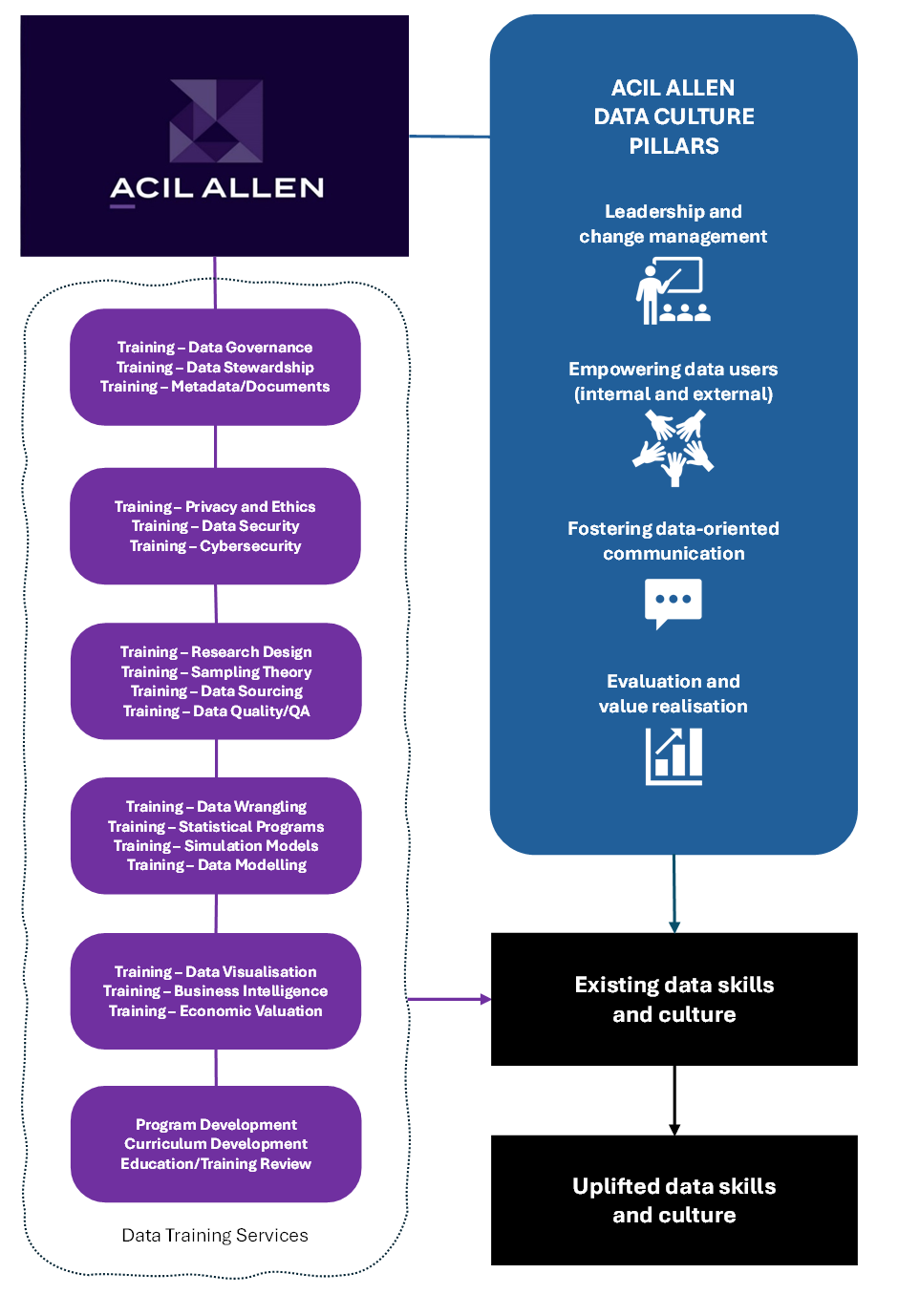
Figure 5: ACIL Allen data training and culture service
Modern organisations survive and thrive, in part, based on their ability to collect, manage and deploy useful data for their business operations. Data science practices support the use of data throughout the data lifecycle and allow organisations to deploy data effectively to meet the needs of their business operations and parallel evaluation and audit requirements. At ACIL Allen we are skilled in all aspects of these processes, with special expertise in incorporating parallel economic evaluation processes and ensuring that good data governance and data processes are supported by quality training and a strong data culture.
[1] For example, see our related articles on present data and digital strategy for the Australian Government.
[2] Data may also be archived for a period of time and then later destroyed, depending on business needs and operative privacy principles.

